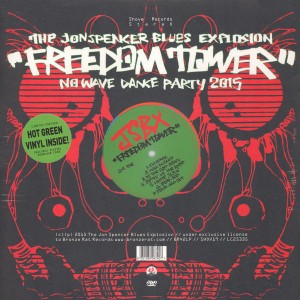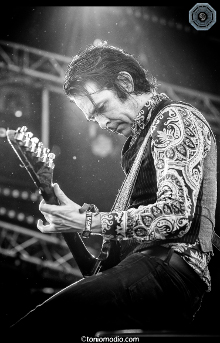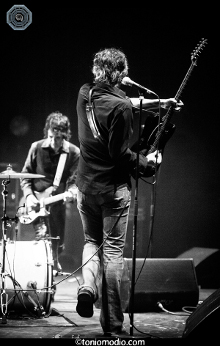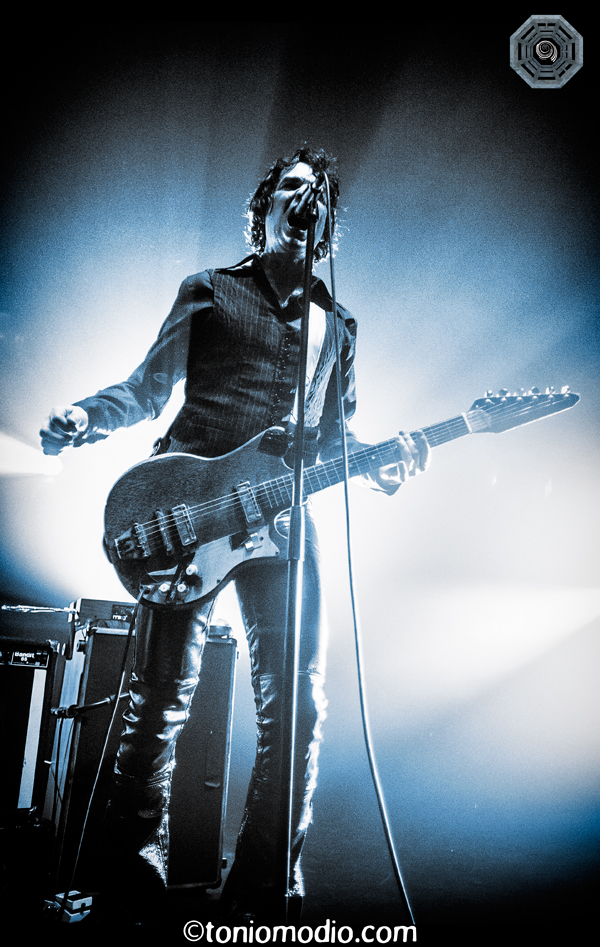 “…I went to Malibu. I flew in [guitarist] Judah Bauer, [bassist] Erik Paparazzi, [keyboardist] Gregg Foreman and [drummer] Jim White. I rented this big house in the middle of nowhere, so I could walk my dog. I spent my life’s savings, because I got told, quote, “I needed to put out a hit record.” After I’d worked and had these little ditties ready, I scratched and I started over. I played them the little ditties, and I tried to get live-to-tape, band-recorded versions of them, and it didn’t fuckin’ work out. I’ve got all that shit on tape, and some of those parts, like two bass parts of Erik are on the record.”
“…I went to Malibu. I flew in [guitarist] Judah Bauer, [bassist] Erik Paparazzi, [keyboardist] Gregg Foreman and [drummer] Jim White. I rented this big house in the middle of nowhere, so I could walk my dog. I spent my life’s savings, because I got told, quote, “I needed to put out a hit record.” After I’d worked and had these little ditties ready, I scratched and I started over. I played them the little ditties, and I tried to get live-to-tape, band-recorded versions of them, and it didn’t fuckin’ work out. I’ve got all that shit on tape, and some of those parts, like two bass parts of Erik are on the record.”
NashvilleScene.com have recently published an interview with Cat Power in which she discusses the recording of Sun and working with Dirty Delta Blues. Visit the site to read the full interview.
Link: nashvillescene.com/nashvillecream/archives/2013/11/06/cat-power-the-cream-interview
Hello, Chan. How are you?
Edd?
That’s right.
Ooh, you’re Australian?
No, I’m actually from Tennessee.
Oh, my gosh. Well, your accent just sounded, uh…
Sounded Australian? Well, I’ve been listening to The Go-Betweens a lot lately, Chan.
You have? I love your accent.
Thanks, Chan. So, you spent some time in Memphis when you were growing up, and I know you recorded The Greatest there with guitarist Teenie Hodges, who played with Al Green, and other Memphis musicians. Is that an era you like to talk about?
Sure, yeah, whatever you wanna talk about. Funny you should mention that — I’m going down to Memphis to see everyone on Halloween night. My friend did a movie about Teenie, a documentary. [Famed Memphis rhythm section] Hi Rhythm’s gonna play. The documentary is just about Teenie, but they’re gonna play together.
I understand Teenie is in poor health these days.
Teenie has emphysema, and he’s had it for a while. He needs care, you know? Stubborn as we all are, we all need care. He plays sometimes. Teenie would love to be playing every damn day.
What was behind your decision to record in Memphis?
I also did What Would the Community Think there. My friend, he was the assistant engineer, Stuart Sikes, so we always kept in touch and stuff. So when I got pressured into recording a record, I was on tour, and I got pressured to do this record. I was in England and I was having lunch with some friends — I never get to see my friends. One came in from Holland, one came in from Paris, and I was in London, and we were all eating some amazing dim sum, and my friend who used to work at Matador was there, and he said, “Chan, I just have to ask you a few questions, ’cause we just want to help you get this record made.” So I was being kind of an asshole, but I was just like, “You know, I always know what’s best for me.” If you’re an addict you don’t, but I’m not, and I never have been. I pretty much have always been a really good thinker for myself.
So he was like, “If you could have any band, what band would you have?” And my first thought was Otis Redding’s band, but that ain’t gonna happen. So I said, “Al Green’s band.” And he said, “OK, where would you record it?” And I was like, “Duh, Memphis.” And he said, “Who would produce it?” And I said, “Duh, no producer, just get Stuart Sikes to engineer it.” And he picked the studio, and that was that. I just needed somewhere cheap — I didn’t give a crap where it was, as long as they had a good board and good tape.
How is Sun different from your earlier works, in terms of the process?
Sun was the first record — I tried to do everything for the first three years bouncing it through to tape. I bought all this gear, and then I went ahead and used the shit out of Pro Tools, for that last nine months in Paris. I’ve always only ever done one or two takes, live, of everything I’ve ever done, ever recorded. On Sun, everything’s first take. I just did about 75 to 125 tracks per song. Everything was first take on everything I did, but everything was a mistake. I made those mistakes work, you know. I’m really good at Pro Tools now.
So you went with ideas as they came to you?
First thing that always happens to any song, it’s like a triad. That’s what I call it in my brain. It’s my guitar, my vocal, and the tempo that I’m strummin’ it. There’s three pieces: The tempo is my beat, the note is my key, and the vocal is the words. I think of things as a triad. Same with Sun — every song started with either a guitar and a vocal, a keyboard and a vocal, a synthesizer and a vocal. It’s always the lyrics, the melody and the tempo first. I want to say that it’s super-normal.
What came after those initial ideas?
That part was very quick, but the other part, to actually make it a damn song, I’d say it took a year and a quarter, ‘cause I went to Malibu. I flew in [guitarist] Judah Bauer, [bassist] Erik Paparazzi, [keyboardist] Gregg Foreman and [drummer] Jim White. I rented this big house in the middle of nowhere, so I could walk my dog. I spent my life’s savings, because I got told, quote, “I needed to put out a hit record.” After I’d worked and had these little ditties ready, I scratched and I started over. I played them the little ditties, and I tried to get live-to-tape, band-recorded versions of them, and it didn’t fuckin’ work out. I’ve got all that shit on tape, and some of those parts, like two bass parts of Erik are on the record.
Iggy Pop makes an appearance on “Nothin’ but Time.” How did you integrate the other parts from the other players, and were there other people you wanted to play on the record?
I asked, you know, Auerbach, if he would play — Dan — and he got all those Grammys and blah-blah-blah, so he was very unavailable. That Judah guitar part that I flew from our live versions in Malibu, that I ended up flying onto my digital Sun record, that actually fit, and I just kept it. Also, in “Ruin,” I’m playing drums. I’m playing everything on the record, right, except for two bass parts of Erik’s. One of them is in “Cherokee,” which I flew over from the tape track over to my digital. And then, on “Silent Machine,” [there is] this scratchy guitar you can hear going, “Uhm chicka-wokka, chicka-wok,” and then there’s a drum part by Jim White. I had to work on his drum part from that tape for two days to get it to fit into the structure of “Ruin.”
You have said that there was pressure on you to make a hit record with Sun.
It was a private conversation that I had with one person. And I think that — you know, I have a really good memory — I think I can understand that person’s reasons to say that thing to me. But the quote-unquote “need to make a hit record,” at first it was like this arrow in my heart. It kinda sat there for about eight months. I quit working and everything, you know, I just quit everything. I went back to being a stepmom and stuff, and I pretended, and I forgot, and I’m like, “Whatever.” And it’s impossible, if you’re a creative type, you always are gonna do something creative. And so I went back to writing songs, and I said, “Fuck it, I’ll just spend my life savings and I’ll get this damn house, and I’ll buy all this gear, and I’ll fuckin’ fly these dudes out, and I’ll go through eight engineers, to get this thing done.” I learned that I should never have questioned myself. I should have always stuck with what I wanted to do in the fuckin’ beginning, and never let anybody tell me something and break me in half. I went back to my original stuff, and worked on it by myself for about nine months. When I delivered Sun, it came out at No. 10 on Billboard. I delivered my hit record, and then I got sick, two days after my record came out.
That sounds like a very difficult time. What was the nature of your illness?
I had this stress-immune disorder called angioedema. I never knew I had it, but apparently, there was a lot of mystery about me being a kid. I was really sick when I was a baby, puffed up and stuff, and they just thought it was from trauma in the womb and stuff, and that I was so allergic to all this shit, which is a total lie. Back then, they just didn’t know. There’s only 6,000 people that are born with it in this country.
Is it like an allergy?
No, people have reactions to food and things like this, but it’s something you’re born with. ‘Cause when I was little, I’d swell up, and it’s from stress. It can go anywhere — it can go in my breast, in my knee, it can go in my wrist, the side of my head. It can go anywhere.
It sounds awful, Chan.
Yeah, it was pretty frightening. I got it when I was in Mexico twice, and that was a fuckin’ nightmare. The people that healed me — when I went to Mexico, and the doctor when I saw him, it was in my throat, you know, I can’t breathe, you understand, I could’ve died. The day after my record came out, I had a tube down my throat, and they told me they had to put me in a coma to save my lungs. My best friend’s running down the hall, and she was like, “You’re Top 10!,” and I’m choking and I’m crying. That’s the last thing I gave a shit about, until I got healed. I’m telling you the truth: I got healed through acupuncture, different herbs, and homeopathic remedies. That’s what drove it out.
I’m glad you’re better. Before I forget, I want to make sure to tell you how much I admire your taste in selecting songs to cover.
Thank you. I really am pissed off at the whole modern generation who knows nothing about old music. Historically, you can look at The Rolling Stones’ first record, and you could look at The Beatles. Everybody talks, “Oh, covers,” but all these fuckers, they know every Beatles song, but what they don’t know is that everybody used to do covers. In the ‘80s, everything changed, and it was, “Me, me, me, me, me, me.” For people who don’t understand, that’s a tradition of American song. They just need to get over it, and start learning, ‘cause I’m not going to stop doing covers.
I’m with you, Chan. It’s been great talking to you.
Thanks. You should say hello after the show. Just say you’re the Australian. I’ll remember.


![The Limiñanas - Faded [Red] (2xLP, FRANCE)](http://www.pop-catastrophe.co.uk/wp-content/uploads/2024/11/The_Limainanas_-_Rouge-copy-294x300.jpg)
![Jon Spencer – Sick of Being Sick! [Clear] (LP, UK)](http://www.pop-catastrophe.co.uk/wp-content/uploads/2024/07/image-300x300.jpg)
![Jon Spencer & The HITmakers - Spencer Gets It Lit [Clear] (LP, UK)](http://www.pop-catastrophe.co.uk/wp-content/uploads/2022/02/jsgetsitlit-300x300.jpg)
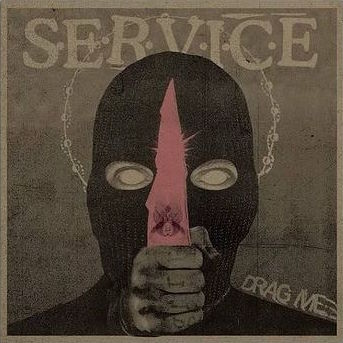
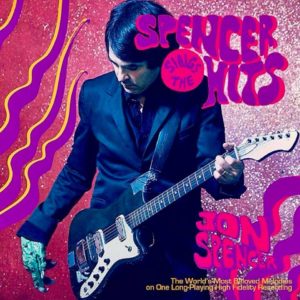
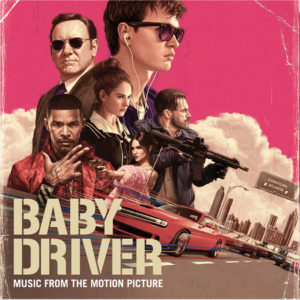
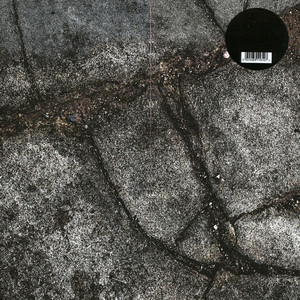
![Boss Hog - Drinkin', Lechin' & Lyin' [2016] (LP, US)](http://www.pop-catastrophe.co.uk/wp-content/uploads/2016/04/bh-DLL-640-150x150.jpg)

